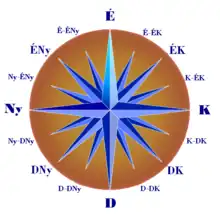É-ÉK
Hungarian

Compass rose
Etymology
Abbreviation of észak-északkelet (“north-northeast”).
Pronunciation
- IPA(key): [ˈeːsɒk ˌeːsɒkːɛlɛt]
Declension
| Inflection (stem in -e-, front unrounded harmony) | ||
|---|---|---|
| singular | plural | |
| nominative | É-ÉK | — |
| accusative | É-ÉK-et | — |
| dative | É-ÉK-nek | — |
| instrumental | É-ÉK-tel | — |
| causal-final | É-ÉK-ért | — |
| translative | É-ÉK-té | — |
| terminative | É-ÉK-ig | — |
| essive-formal | É-ÉK-ként | — |
| essive-modal | — | — |
| inessive | É-ÉK-ben | — |
| superessive | É-ÉK-en | — |
| adessive | É-ÉK-nél | — |
| illative | É-ÉK-be | — |
| sublative | É-ÉK-re | — |
| allative | É-ÉK-hez | — |
| elative | É-ÉK-ből | — |
| delative | É-ÉK-ről | — |
| ablative | É-ÉK-től | — |
| non-attributive possessive - singular |
É-ÉK-é | — |
| non-attributive possessive - plural |
É-ÉK-éi | — |
| Possessive forms of É-ÉK | ||
|---|---|---|
| possessor | single possession | multiple possessions |
| 1st person sing. | É-ÉK-em | — |
| 2nd person sing. | É-ÉK-ed | — |
| 3rd person sing. | É-ÉK-e | — |
| 1st person plural | É-ÉK-ünk | — |
| 2nd person plural | É-ÉK-etek | — |
| 3rd person plural | É-ÉK-ük | — |
This article is issued from Wiktionary. The text is licensed under Creative Commons - Attribution - Sharealike. Additional terms may apply for the media files.
